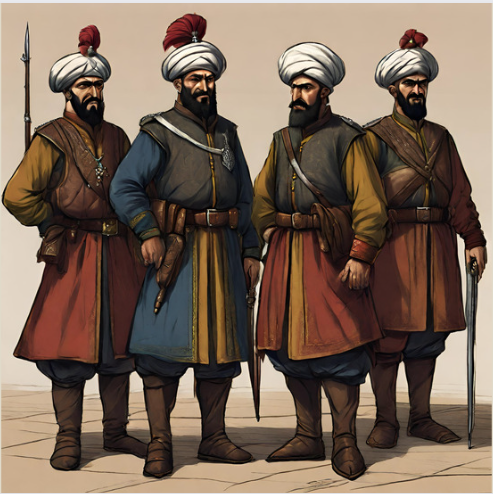This article looks at the interesting and intricate realm of espionage and intelligence in early modern Europe (late 15th to late 18th century). It investigates how powerful nations’ and opposing kings’ secret networks changed Europe’s political environment and affected historical events.
By reading this article:
- You will understand the importance and prevalence of espionage and intelligence in early modern Europe.
- You will learn about the functioning of espionage systems in different states.
- You will see how espionage activities were used in political and diplomatic maneuvers.
- You will learn the unique features of the Ottoman Empire’s espionage system and its differences from other systems in Europe.
Duchy of Milan
It was one of the best information-supplying city-states of the late medieval period. Milan endeavored to make Francesco the “master of news” by creating an effective network of diplomats and intelligence gatherers, especially under Francesco Sforza, who was literally the “signore di novelle” (master of news). In addition, from the very beginning, Sforza sent envoys to all the major Italian city-states, including Naples, Rome, Florence and Venice, despite several interruptions during wars and diplomatic ruptures.
Florence
The intelligence and espionage network was systematically developed by Cosimo I, founder of the Grand Duchy of the House of Tuscany, who was chosen by Charles V at the age of seventeen to succeed the murdered Alessandro de Medici on the throne of the Duchy of Florence. Paolo Preto has argued that the intelligence network of late Renaissance Florence largely resembled that of Venice and other major European states.

Genoa
Genoa quickly became a state of surveillance, with ubiquitous spies and informers keeping an eye on anything suspicious. In order to avoid the danger of overthrowing the government, citizens were forbidden to enter or leave the residences of foreign ambassadors in the city.
Vatican City
At the end of the sixteenth century, when the Italian city-states entered a phase of gradual decline, the Vatican gained momentum as the pinnacle of bureaucratic and state innovation. This was no coincidence, for the Catholic Church was strongly associated with the rise of the knowledge state, which eventually produced a mixed civil service and one of the best-organized information systems of the early modern world.
Imperial Spain
Among his contemporaries, Felipe I made a name for himself as the most well-informed monarch of his time, unabashedly delighting in flaunting his unparalleled knowledge of current events to foreign ambassadors visiting his court, just to catch a glimpse of their astonished reactions. Felipe watched the workings of the intelligence wheels with absolutist fervor, obsessively controlling every detail of intelligence operations, from the recruitment and payment of spies to the minutiae of intelligence operations.
Tudor England
It is important to emphasize that the management of information in Early Modern England was not the monopoly of a single official in the service of the Crown. Secret information reached the monarch from a wide variety of sources, including the Cabinet, the Privy Chamber and the unique spy networks of respected intelligence chiefs such as Francis Walsingham. The peculiarity of Early Modern England was based on the fierce competition between Parliament and the Crown over extensive secret information, which sometimes had to be withheld from certain power holders and the public.
Bourbon France
In his voluminous study of the Sun King’s espionage activities, he enumerates different types of French spies, which can be summarized in five categories: itinerant agents sent into the war zones, amateur “horseflies” operating in the palace or important urban centers, professional spies, today called “moles”, who worked with French diplomats and foreign diplomats who, hiding behind noms de guerre, provided intelligence gathering services to the Sun King, and intelligence chiefs who created their own spy networks and competed to serve the king’s rights.
The Sun King’s informers were stationed at key points across Europe, from Marseille and Venice in the Mediterranean to Copenhagen and Danzig in the Baltic and Hamburg and Amesterdam on the North Sea.

Ottoman Empire
The essentially unique Ottoman characteristic was the staunch resistance of Bab-ı Ali, a name for the Ottoman government referring to the gate of the Topkapi Palace, the main seat of the sultans and their administration, not to establish permanent embassies overseas until the eighteenth century, for two reasons: First, a proud sense of Ottoman superiority, which implied that it was the responsibility of the European powers to insist on the Sultan’s approval and therefore they should place their representatives in the Ottoman capital; and second, the lack of an established state bureaucracy with a centralized chancellery at the service of the state.
The Ottoman Empire’s intelligence networks were surprisingly effective in providing the empire’s dignitaries and their superiors with vital information on the affairs of European states. It was this complexity and fluidity that allowed the Ottoman Empire to compare and contrast the information that reached Bab-ı Ali through different routes.
But what also reduced the effectiveness of Ottoman intelligence activities was their unwillingness to establish their own direct diplomatic channels, always through embassies, and the lack of an established diplomatic staff organization responsible for gathering information on the religious, cultural and linguistic characteristics of a foreign country.
If you want to know more about the intelligence wars of the period. Resources we can recommend:
General Resources:
- Christopher Andrew, The Secret World: A History of Intelligence (2018)
- Loch K. Johnson, Secret Agencies: US Intelligence in a Hostile World (2017)
- R.J. Aldrich, GCHQ: The Uncensored Story of Britain’s Most Secret Intelligence Agency (2010)
- David Kahn, The Codebreakers: The Story of Secret Writing (1996)
- Nigel West, Historical Dictionary of International Intelligence (2010)
Sources Specific to Early Modern Europe:
- John Merriman, The Spy and the Spymaster: How the KGB Operates (2005)
- Peter H. Wilson, The Thirty Years War: Europe’s Tragedy (2009)
- Geoffrey Parker, The Military Revolution: Military Innovation and the Rise of the West, 1500-1800 (1988)
- William E. Wilkie, The Cardinal Protectors of England: Rome and the Tudors before the Reformation (1974)
- Paolo Preto, The Secret History of Venice (2011)
Sources Specific to the Ottoman Empire:
- Stanford J. Shaw, The Ottoman Empire in World History (1976)
- Halil Inalcik, The Ottoman Empire: The Classical Age 1300-1600 (1973)
- Baki Tezcan, The Second Ottoman Empire: Political and Social Transformation in the Early Modern Era (2010)
- Suraiya Faroqhi, The Ottoman Empire and the World around It (2005)
- Colin Imber, The Ottoman Empire, 1300-1650: The Structure of Power (2002
Additional Resources:
- Journal of Intelligence History
- International Journal of Intelligence and CounterIntelligence
- Studies in Intelligence
- The Cipher Brief
- The Intelligence Studies Project





